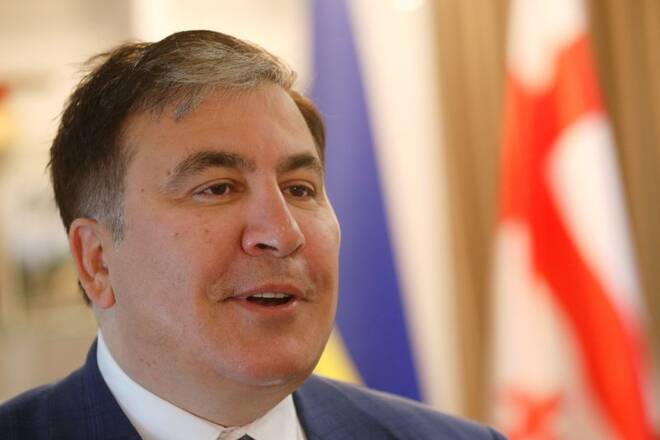Advertisement
Advertisement
Georgian ex-president says he’ll end hunger strike if moved from prison hospital
By:
TBILISI (Reuters) - Georgia's jailed ex-president Mikheil Saakashvili said on Thursday he would end a six-week hunger strike once he was transferred from the prison hospital to a better facility to allow him to recover, according to his lawyer.
TBILISI (Reuters) – Georgia’s jailed ex-president Mikheil Saakashvili said on Thursday he would end a six-week hunger strike once he was transferred from the prison hospital to a better facility to allow him to recover, according to his lawyer.
Saakashvili declared the hunger strike after being arrested on Oct. 1 following his return to Georgia from abroad to rally the opposition on the eve of local elections.
He was transferred this week to a prison hospital in the capital Tbilisi that, according to rights ombudsman Nino Lomjaria, was lacking proper medical equipment and where fellow inmates had threatened and abused him.
The prison service said the allegations were being investigated.
On Thursday, Saakashvili argued in a letter read out by his lawyer Nika Gvaramia that he needed to be moved to a different facility, such as a multifunctional medical clinic, to help him recover once he stopped fasting.
“As soon as…they transfer me from this facility to a corresponding facility, I will immediately stop the hunger strike,” Saakashvili wrote.
He said he had taken into account calls from the European Court of Human Rights and from his allies in the West urging him to stop starving himself.
The ECHR, in a letter published by Georgia’s justice minister, also told the government it should update the court on his health, ensure Saakashvili’s safety in prison and provide medical care for his recovery.
Saakashvili is the most prominent and divisive living figure in Georgia’s post-Soviet history, having come to power via a peaceful “Rose Revolution” in 2003 and led the country into a disastrous war with Russia five years later.
He faces six years in prison after being convicted in absentia in 2018 of abusing his office during his 2004-2013 presidency – charges he has rejected as politically motivated.
(Reporting by David Chkhikvishvili in Tbilisi and Gabrielle Tétrault-Farber in Moscow; Writing by Tom Balmforth, editing by Mark Trevelyan and Andrei Khalip)
About the Author
Reuterscontributor
Reuters, the news and media division of Thomson Reuters, is the world’s largest international multimedia news provider reaching more than one billion people every day. Reuters provides trusted business, financial, national, and international news to professionals via Thomson Reuters desktops, the world's media organizations, and directly to consumers at Reuters.com and via Reuters TV. Learn more about Thomson Reuters products:
Did you find this article useful?
Latest news and analysis
Advertisement
